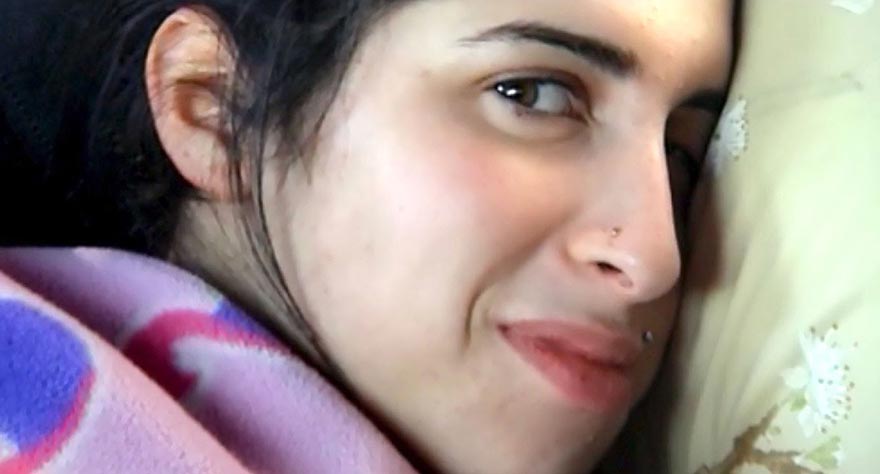Asif Kapadia On Amy Winehouse’s Unanswered Cries For Help

It’s horrific how carelessly we push people into the fire of celebrity, no matter how they beg for mercy. Amy Winehouse was one of the best vocalists of our generation, her music resonating across the world. She was such a talent, in fact, that her music was so masterful it muffled the cries for help she hid in plain earshot, in lyrics buried by the beauty of her own voice.
Asif Kapadia’s Amy forces us to give those songs another listen, revealing a “map to her story,” as he puts it. Upon closer inspection, “Rehab” isn’t a narco-chic pop anthem, but a shockingly literal account of the singer’s constant flirtation with death. The film examines the cold-blooded nature of showbiz and fame, how it took a humble, brilliant Jewish girl from North London and knocked her around so thoroughly that she fell face-first into self-destruction.
I spoke with Asif in San Francisco about the film, which is out nationwide this Friday.

Watching your movie, I was reminded of a moment when, following Britney Spears’ “shaved-head” meltdown in 2007, Craig Ferguson said on the Late Late Show that he refused to make Britney Spears jokes. He made a great speech about how we shouldn’t be kicking these people when they’re down.
That was a really strong piece he did. He was in recovery [himself]. I watched it recently. Someone sent it to me. Have you seen it recently on Youtube?
I have, yeah.
It’s really powerful. The person who sent me that link said, “This is how they should deal with it.” Absolutely right. Weirdly enough, this all joins together. The song they used as a soundtrack to Britney’s breakdown was “Rehab.” That’s how the song became famous in America. It was because of what was happening to Britney and Lindsay Lohan, I think. Nobody knew who sung the song, but Rehab was being used by all the TV shows.
He made that speech years ago, and the disheartening thing is that, today, a lot of talk show hosts who I find respectable and funny still make tasteless jokes about celebrities when they’re at their lowest. Why do you think we still do this?
I don’t know. It’s difficult, because the whole point of comedy is that you’re meant to be on the edge and push boundaries. It’s about challenging perceptions. But specifically about Amy, you realize she’s sick. When you realize someone’s having a breakdown or mentally unstable, it’s not so funny anymore. A lot of these comedians have issues themselves. They know it. With Amy it became really easy to make a joke about her. That’s when she’d become dehumanized.
Watching that footage of her turning her back on that huge audience was disturbing. I’d seen it before, but the way you present it strikes the appropriate tone.
I think that footage of Serbia is well-known, but what seemed to be interesting when we got into it was that everybody said Amy didn’t want to do the shows anymore. For some reason, the machine decided that she needed to. We had all seen it and thought, “What a mess. She’s on drugs, falling around. How pathetic.” That’s how people judged it and shared it. We found that it was Amy’s attempt to take control of the situation, sabotaging it on purpose. She decides not to sing and hang around on stage to make it as bad as possible, so that whole thing would stop. It’s very uncomfortable.
I like that the movie’s uncomfortable.
It’s meant to be. It wasn’t a comfortable story. It wasn’t a nice, “Aw. Isn’t that sad?” There’s much more going on here. The idea was to make the audience feel uncomfortable and culpable, somehow. Did we play a part in this? Were we complicit?
I think we are complicit as long as it’s trendy to knock troubled, famous people down for fun.
Exactly.
I’ve been a fan of Amy’s since the beginning, but I never noticed how plainspoken and autobiographical her lyrics were until I saw your movie. They sound poetic, but they’re surprisingly straightforward and literal.
The lyrics were one of the big revelations for me. Everyone talks about her voice, but I think writing is the most difficult thing. Writing something original and personal that stands the test of time. I think it’s the most difficult thing ever, and she managed to do that. She had these brilliant, literary references built into those songs. As pieces of writing, they’re incredible. And then she had the voice and turned them into something else. And she played guitar and [arranged] the music. You didn’t realize she did all of it.
Another thing that was revealed for me was her intellect. Super smart.
She was really sharp. That image of the girl at the end stumbling around…intellect wouldn’t be the word you’d use. But she was super smart. That was one of the major elements to try and re-dress the balance of how we perceive her, to show how funny and witty and intelligent she was. She didn’t start off messed up. A whole series of circumstances took her in that direction.
My favorite piece of footage is that cell phone video Amy’s friend took of her inside a car. Her friend talks about how she could make you feel like the most important person in the world one second and a nobody the next.
She’s flirting with him. Messing with him. She says, “You sort this out and sort that out, maybe you’d be ready to marry me.” She could switch on and off.
I always thought it was weird, the idea of a filmmaker getting to know somebody so intimately after they’re gone. I can’t imagine what that’d be like. Maybe I’d have dreams about this person or something.
That’s what happens, yeah, yeah. You start dreaming and they become a part of your life. It’s a very weird process that I’ve done twice now. I haven’t met Amy or Senna, but I’ve kind of spent a lot of time thinking about them and getting a taste of their lives in a way. Getting to know her friends, family, band members, husband…she feels like a friend of a friend now. It’s kind of a strange process. Very unusual.
Talk about why North Londoners like yourself have such a sense of pride when one of your own, like Amy, is successful on a grand stage.
She’s from a Jewish community in North London. I’m from a Muslim background, so it’s this sort of immigrant community. But also there’s something about it being creative. I was up the road from Camden, where she lived for a long time, and there was a very weird, edgy, creative period of time when lots of bands, models and writers were around. There were clubs, bars, pubs…people were hanging out there and there was a “scene” going on. There were drugs. It had an energy. It was the good and bad of London all mixed together. There was a darkness there.
Considering what you just described, Amy seems to be very much a product of that place and time.
She was drawn to it. She became one of the key people of that part of town. She’s almost synonymous with Camden.
I typically don’t like when music docs display song lyrics on-screen, but the way you do it is great because we need to see the lyrics to understand just how honest she’s being with us. The music’s so catchy that the words might otherwise be lost.
It’s a map to her story. It’s all there. You have to listen to some of them in a different way to understand her. That’s what I wanted to do, to make you realize the songs are much deeper than you thought when you understand her life more. If you tried playing it without the lyrics, you can’t help but get drawn in by the music, so you’ve got to pay attention to what she’s saying.
I remember dancing in the club to “Rehab.” Now I can see that she was calling out for help. I don’t know. That’s what made me most uncomfortable.
Absolutely. It’s meant to. We danced to these songs, but we didn’t understand what she was saying. It was a cry for help. I didn’t know any of this until I started making the film.
I liked how Yasiin Bey talked about having a crush on Amy.
I know! She had that way—everyone fell in love with her. Every journalist I met. She had some sort of charisma that people would fall for her. She had this way of making someone feel like they were the most important person in the universe. For that small amount of time, they had that connection. Then, it’s gone.
You explore some of her artistic anxiety as well. There’s that clip of her having a meltdown in the studio with Tony Bennett.
If Tony Bennett says she’s one of the greatest singers, he should know! He’s heard them all. He was there. That sequence is really powerful because it’s the first time she’s been in a studio for three years. You can see her confidence is rock-bottom. She always uses this figure of speech, “I don’t want to waste your time.” She always thinks she’s a waste of time.It’s a weird line to keep using. She says that again and again and again.
